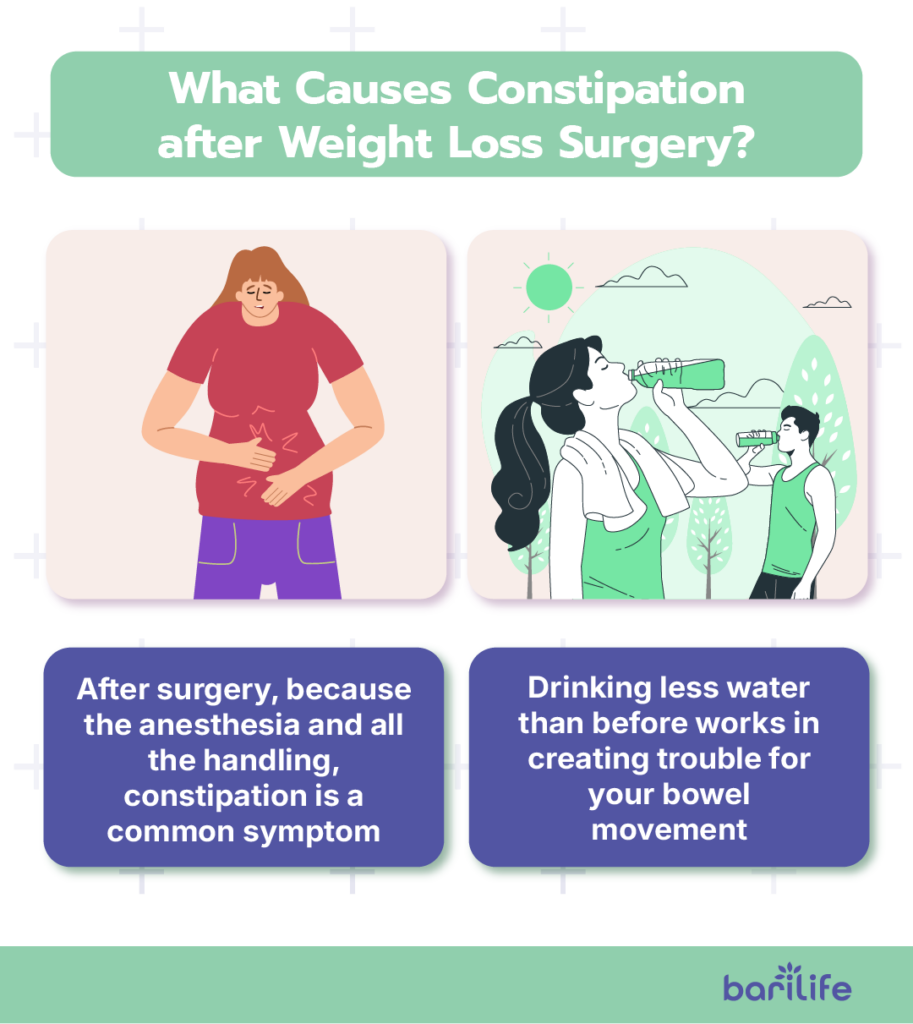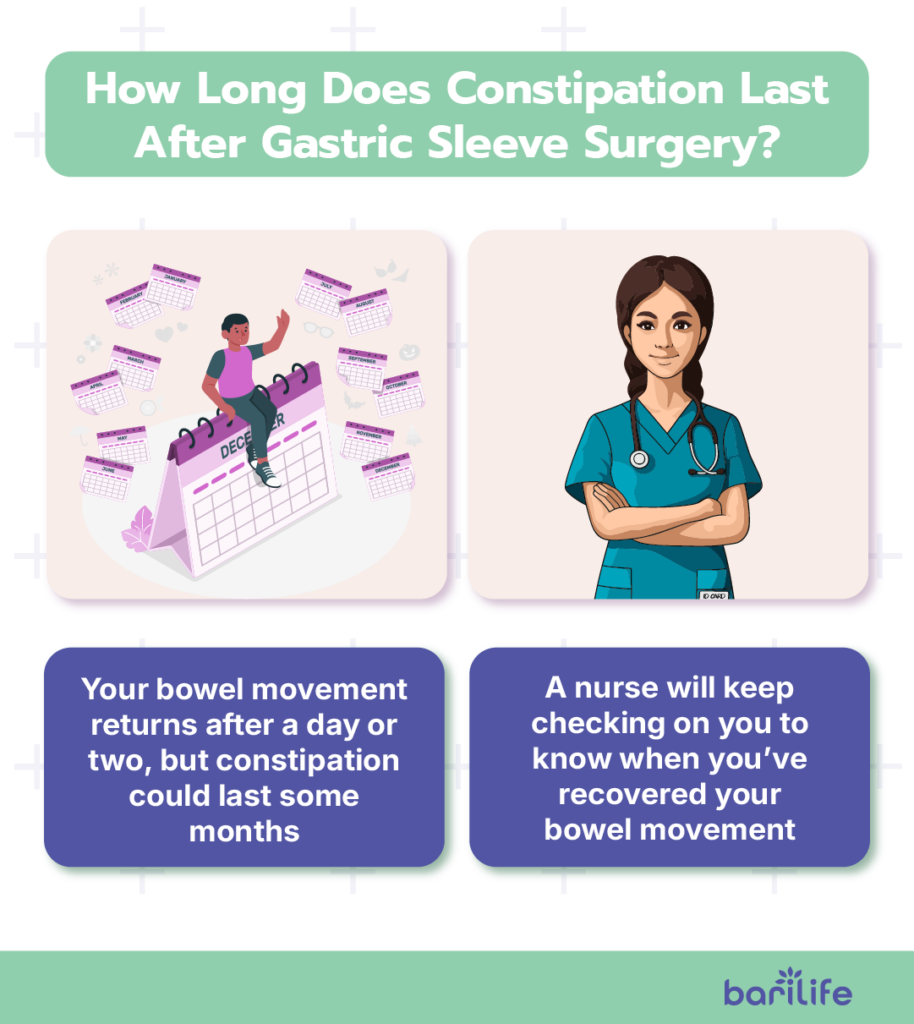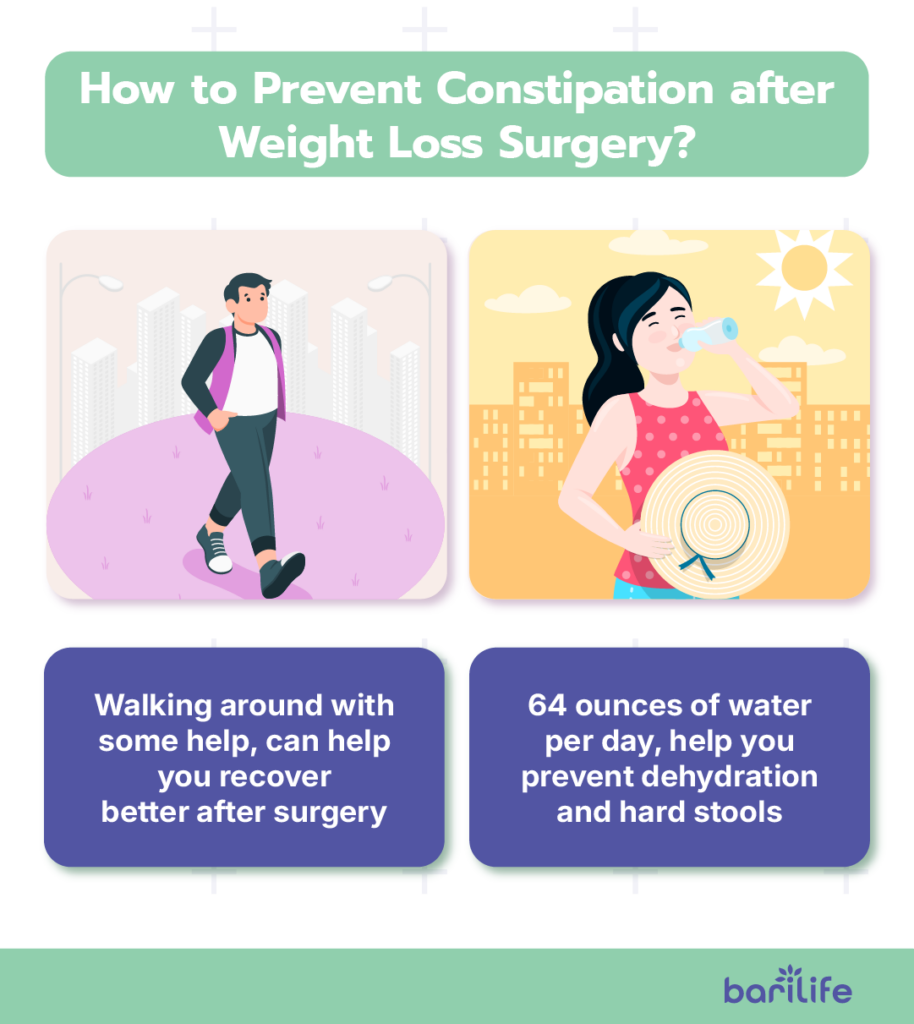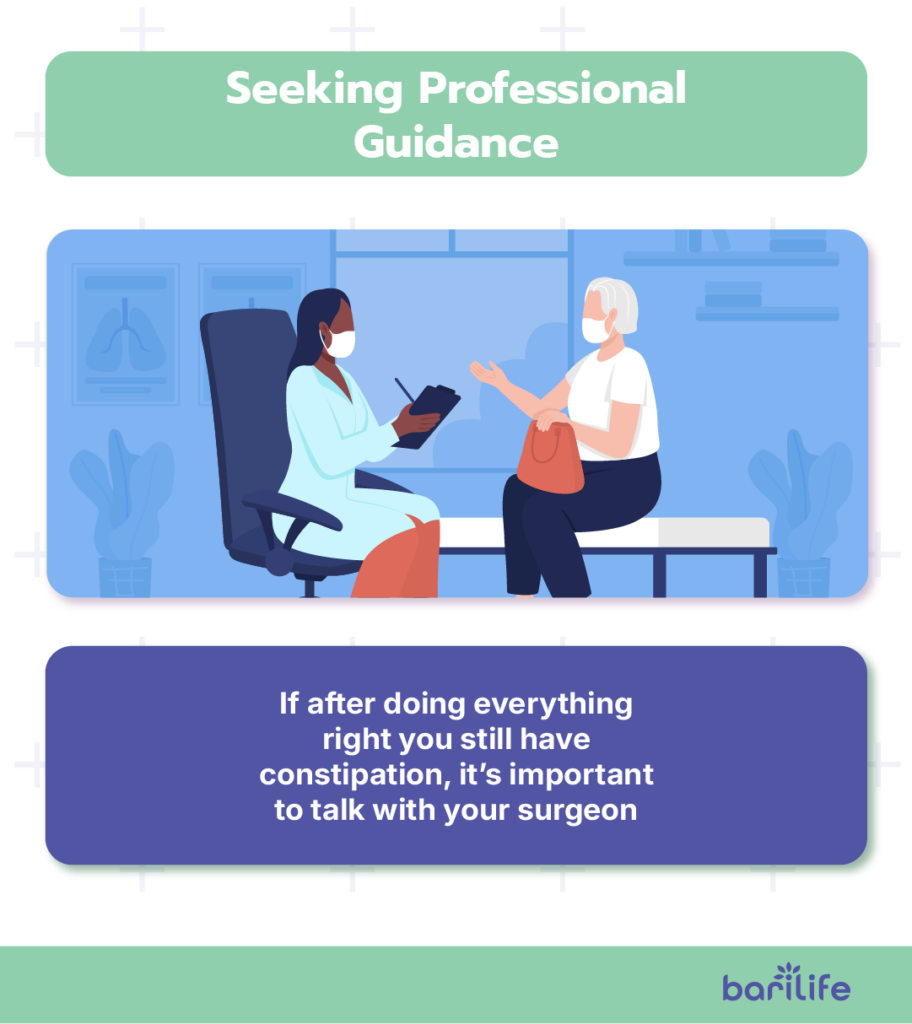Key Takeaways
- Constipation is a common concern after bariatric surgery.
- Walking regularly, staying hydrated, and gradually introducing fiber into your diet are several ways you can ward off constipation.
- For further help, talk with your surgeon or registered dietitian.
Constipation is a common, but unfortunate, side effect of bariatric surgery. Weight loss surgery can have an unglamorous side, including gas after bariatric surgery and other digestive issues. It can stem from various factors. They include your gut adjusting, the meds’ side effects, low fiber, and not enough water. Additionally, certain bariatric vitamins and supplements, like bariatric calcium chews and bariatric multivitamins, may also influence digestive health.
In healthcare, constipation is typically defined as having three or fewer bowel movements weekly or having dry stools that are hard to pass. Other symptoms may include diarrhea after bariatric surgery or even bowel problems after bariatric surgery.
We know that not going is an uncomfortable and worries some problem. So, we created this completed guide to help you understand why you may be constipated after weight loss surgery, give you further insight into how long it may last, and offer tips to get you going. Consider also adding bariatric snacks and bariatric protein shakes as softer, gut-friendly choices to support your dietary needs post-surgery.
Table of Contents
What Causes Constipation after Weight Loss Surgery?

During surgery, your surgeon must handle parts of your digestive tract to make the necessary changes, and you also receive anesthesia. Both aspects can cause your digestive tract to slow its normal gut movements for several days after bariatric surgery, making it harder to move your bowels.
To further complicate the matter, you’ll need some strong pain medication right after surgery to keep you comfortable. Narcotic pain medications are typically given short-term, but they are known for causing constipation.
The dietary changes you need to make after surgery can also lead to constipation. With a smaller stomach capacity, you won’t eat as many fiber-rich foods like fruits, vegetables, and whole grains, which your digestive system needs for smooth bowel movements. Incorporating bariatric multivitamin with iron or liquid bariatric vitamin might help you get essential nutrients while adjusting to the new diet.
And adding insult to injury, we know that drinking enough water can be difficult after bariatric surgery. However, this can cause you to become dehydrated and lead to dry stools that are hard to pass.
Signs and Symptoms of Constipation
Knowing the signs and symptoms of constipation can help you take action before you get too uncomfortable.
One of the first red flags that should grab your attention is a decrease in bowel movements. Typically, fewer than three bowel movements a week should tip you off that you are getting constipated.
Another classic symptom is hard, dry stools that are difficult to pass. They may be pellet-like and painfully unpleasant to excrete.
Lastly, all this backing up in your system can cause you to feel bloated, and you may have uncomfortable stomach cramping. When you go to the bathroom, you may feel like you still have more stool to pass.
How Long Does Constipation Last After Gastric Sleeve Surgery?
How long constipation lasts after weight loss surgery can vary from person to person. One study found that over 25% of study participants were still experiencing some constipation six months after surgery.

During your initial recovery phase right after surgery, your surgeon and nurses will be carefully listening for the return of your bowel sounds. They may frequently listen to your abdomen with their stethoscope to check for gurgling sounds, which means your gut motility has returned.
And while under normal circumstances, people don’t have discussions about passing gas, don’t be surprised when your surgeon and nurses ask if you’ve passed any gas. Passing gas is a sign that your intestines are up and running again. Usually, this happens within a day or two after surgery.
For the first few weeks following surgery, your body is adjusting to the changes made to your digestive tract, the new eating habits, and smaller portions. Constipation during this time may last several weeks or months, depending on how your body adjusts.
How to Prevent Constipation after Weight Loss Surgery?
Walking right after surgery is one of the best ways you can help your digestive system wake up and prevent constipation.
Even though you may feel sleepy and a bit uncomfortable right after surgery, your nurse will encourage you to get out of bed and go for a stroll down the hall. Just know that this isn’t a form of torture but is a great way to get things moving.
It’s also important to listen to your surgeon’s guidelines on how much water you should drink daily. Typically, it’s around 64 ounces of water per day, which can help you prevent dehydration and hard stools. Remember, though, you can’t drink that all at once. Be sure you are sipping on water all throughout the day.
When it’s appropriate, you can also start gradually increasing your fiber intake. But don’t hit the salad bar right away. After surgery, you’ll need to eat soft and easy-to-digest sources of fiber and maybe take a fiber supplement.

And we can’t say it enough, keep walking. Regular gentle exercise, such as walking and stretching, supports healthy digestion and can help prevent you from getting constipated.
Ongoing Treatment Strategies for Constipation
As you settle into life after surgery, you’ll need to maintain several ongoing strategies to support healthy digestion and regular bowel movements.
Gradually increasing your fiber intake is essential, but it’s best to go slow—adding too much fiber too soon can cause bloating and discomfort. Try incorporating small servings of gentle fibers such as oatmeal, canned fruits or vegetables, and a fiber supplement like psyllium.
Staying hydrated continues to be key, especially since you are eating smaller meals. Be sure to follow your surgeon’s guidelines on how much water you need to be drinking daily. Having a refillable water bottle with measurements on the side can be a helpful way to make sure you are drinking enough water throughout the day.
If you need extra help, you may also want to consider taking an over-the-counter stool softener. However, it’s important to talk with your healthcare provider about this first and only take them under medical supervision. Taking these medications regularly can cause the digestive system to rely on them and disrupt your natural bowel function.
Lastly, give your body a regular time each day to have a bowel movement. Even if your urge isn’t strong, go sit on that throne and let your body relax. Doing this can help your body develop a regular bowel movement schedule and prevent constipation from holding it too long.
Seeking Professional Guidance
When it comes to managing constipation after bariatric surgery, don’t hesitate to reach out for professional help.
Having a registered dietitian you check in with regularly can be invaluable in ensuring you are eating a balanced diet with the appropriate amount of fiber and are staying hydrated. Some dietitians are experts in helping people after bariatric surgery and can give personalized advice on your new way of eating. They’ll also know what adjustments need to be made if you do start to develop constipation and can help you get back to being regular.

If you find that you are doing everything right and are still having constipation, it’s important to talk with your surgeon. They can decide if you need to make any dietary tweaks or medication adjustments. They also need to rule out any complications that may be an underlying issue.
If you think a supplement may help, talk with your surgeon or registered dietitian first. This helps ensure that anything you choose aligns with your post-surgery goals and won’t interfere with your normal bowel function.
Conclusion
Constipation after bariatric surgery can be an uncomfortable but common problem. But with the right strategies and habits, it’s manageable.
Right after surgery it’s important to prioritize walking regularly. You also need to drink enough water each day and gradually introduce soft, fiber-rich foods into your diet.
For further help, talk with your surgeon or regularly check in with a registered dietitian. They can determine if you need to make dietary changes or if you will benefit from taking an over-the-counter medication or supplement to soften your stool.
If you want to learn more, why not check out these articles below:
- Dumping Syndrome after Bariatric Surgery
- Hungry after Bariatric Surgery
- Nausea after Bariatric Surgery
- Foamies after Bariatric Surgery
- Heartburn after Bariatric Surgery
- Dry Mouth after Bariatric Surgery
References
Afshar S, et al. (2016). The effects of bariatric procedures on bowel habit. Obes Surg.




What are your tips and tricks to post-bariatric success?